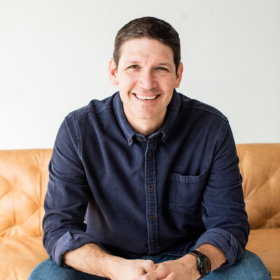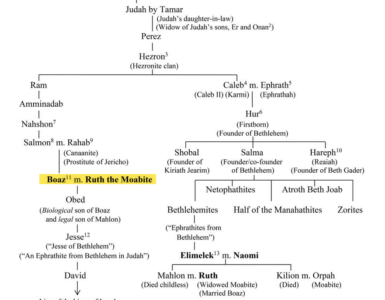 Critics ask, “Why would anyone become a Christian when there’s so much hypocrisy in the church?” With de-conversion stories being reported, why is it that the church inadvertently produces atheists despite its life-giving message? Does atheism explain the human experience better than Christianity? How can the truth of Christianity matter when the behaviors of some Christians are reprehensible?
Critics ask, “Why would anyone become a Christian when there’s so much hypocrisy in the church?” With de-conversion stories being reported, why is it that the church inadvertently produces atheists despite its life-giving message? Does atheism explain the human experience better than Christianity? How can the truth of Christianity matter when the behaviors of some Christians are reprehensible?
Bible Gateway interviewed Mary Jo Sharp (@MaryJoSharp), author of Why I Still Believe: A Former Atheist’s Reckoning with the Bad Reputation Christians Give a Good God (Zondervan, 2019).
Describe why you were an atheist as a young woman.
Mary Jo Sharp: I didn’t grow up in the church and didn’t know much about Christianity other than what I saw on TV and in the movies. The societal environment of my childhood years also lacked a cultural Christianity: Oregon has rated among the top states for least religious participation in America. So, I thought non-religious people were the standard or the normative people and that religious people were somewhat of the fringe of society.
I wouldn’t have called myself an atheist growing up because I didn’t encounter that term until later on when I encountered Christianity. I just didn’t believe in God, nor did I see why I needed to do so.
[Read the Bible Gateway Blog post, Does Suffering Disprove the Existence of a Good God?]
How did the gift of a Bible begin to influence your change from atheism?
Mary Jo Sharp: The Bible was gifted to me by a teacher that I greatly respected, so I was interested in reading it. I don’t know exactly what I expected. As a child I enjoyed mythology and thought perhaps it might be similar in some ways. When I read the Bible, I realized it was quite different; specifically the Gospels. They read like ancient news reports. They felt very much like I was reading about something today, especially Luke’s account. For example, the start of his Gospel: “It also seemed good to me, since I have carefully investigated everything from the very first, to write to you in an orderly sequence, most honorable Theophilus, so that you may know the certainty of the things about which you have been instructed (Luke 1:3-4).
When you became a Christian, how did going to church disappoint you?
Mary Jo Sharp: I was drawn to God by the truth, goodness, and beauty I found in the world. Upon entering into church community, I expected to find people who were committed to worshiping the good, true, and beautiful God and who actively formed their lives around those transcendentals. I sought an authentically loving body of Christ. What I found instead was judgmentalism, hypocrisy, insecurity, self-centeredness, control issues, lustfulness, and basically all the same problems of people outside the church. I found people who patterned their lives around these behaviors rather than on becoming Christlike. I was bitterly heartbroken.
[Read the Bible Gateway Blog post, Thinking Like An Atheist: An Interview with Anthony DeStefano]
Why did you decide to study apologetics?
Mary Jo Sharp: I really stumbled into apologetics while despairing about my situation in the church. When my doubt bloomed into intellectual questioning about the reasons for my belief, I began to search for answers to the questions of “Why do I believe God exists?,” “Why do I think Jesus rose from the dead?,” and “Why do I trust the Bible?” I eventually discovered a master’s degree program in apologetics and enrolled.
How should doubt play a role in faith?
Mary Jo Sharp: Doubt can be part of maturing in our relationship with Christ. When we doubt, often times it’s a result of unmet expectations or the experience of evil. However, doubt may also just be a part of growing older and shedding our young faith. As our thinking matures, it’s a natural process to begin questioning what we think we know, and why we trust in certain authorities. It’s a process of self-reflection on our own beliefs. However, it’s often given a negative connotation. But we should be patient with and “have mercy on those who doubt” (Jude 1:22).
Why do you believe Christianity explains the human experience better than does atheism?
Mary Jo Sharp: Christianity provides a philosophical framework for fundamental aspects of what it means to be human. For example, the ability to trust our reason—our truth-making faculty—finds no grounding in an atheistic framework, because reason is a result of the blind, impersonal forces of natural selection which are aimed at survival, not truth. So rationality, our ability to know truth, comes from entirely random processes with no purpose or intention. Whereas in Christianity, our rationality is a reflection of the Creator, part of our being made in the image of God (Genesis 1:26). So, rationality comes from a rational being and was purposefully designed to function in a manner to discover truth.
What is “the problem of beauty” you write about in the book?
Mary Jo Sharp: The Bible teaches that God is good, true, and beautiful. Evangelicals are not currently relativistic about truth and we’re not relativistic about morals. We believe in truth and falsity and also in right and wrong. Yet when it comes to the third aspect of God, his beauty, we’ve taken a secular view that beauty is relativistic, or solely in the eye of the beholder. We’ve adopted this view as if there’s no problem in doing so. However, there is a problem with doing so: because the Bible talks about God’s goodness, truth, and beauty as objective realities.
If we really believe God is beautiful and we believe God is real, we should take beauty seriously. If we don’t properly appreciate the beautiful, we can’t properly appreciate God. Thus, we need to be wary of using a secular mentality to view this objective reality of God’s beauty.
What do you want your book to accomplish?
Mary Jo Sharp: My desire is that people will see through my own struggle with hypocrisy and judgmentalism in the church that the bad behaviors of Christians can never eradicate the transforming grace and truth of Jesus Christ. I hope someone will find some healing through reading my story.
What is a favorite Bible passage of yours and why?
Mary Jo Sharp: I love 1 Corinthians 15:14-15, because Paul makes a truth claim saying that either Jesus rose from the dead or he did not. He says if Jesus did not rise from the dead, then our faith is in vain, it’s useless.
I love this passage because it’s so contrary to the view that Christians are just blindly believing in God. Paul lays out that if Christ hasn’t actually risen, we have no business believing so or preaching Jesus is risen. Then, in verse 20 and beyond, he affirms that Christ has risen from the dead and is the reason we have hope.
What are your thoughts about Bible Gateway and the Bible Gateway App and Bible Audio App?
Mary Jo Sharp: I’m a frequent visitor to the Bible Gateway website because it’s the fastest way for me to access multiple translations of the biblical text when I’m working on a project. Plus, it’s laid out well and user-friendly.
Why I Still Believe is published by HarperCollins Christian Publishing, Inc., the parent company of Bible Gateway.
Bio: A former atheist from the Pacific Northwest, Mary Jo Sharp was raised without religion. She is now an assistant professor of apologetics at Houston Baptist University and the founder and director of Confident Christianity Apologetics Ministry. Mary Jo is the author of Why I Still Believe: A Former Atheist’s Reckoning with the Bad Reputation Christians Give a Good God and Defending the Faith: Apologetics in Women’s Ministry. She is an itinerant speaker on apologetics throughout North America and has engaged in formal debates on Islam. She focuses on using love and logic in order to uncover truth.
Get biblically wise and spiritually fit by becoming a member of Bible Gateway Plus. Try it right now!
The post How an Atheist Turned to Jesus Despite the Church: An Interview with Mary Jo Sharp appeared first on Bible Gateway Blog.















